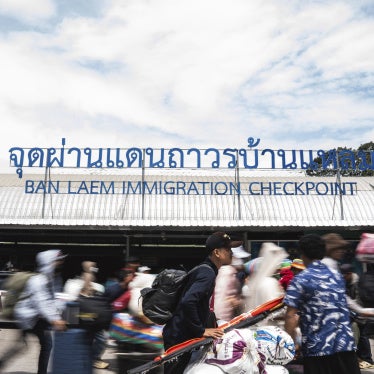As detainees rioted at an immigration detention center on Australia's remote Christmas Island on November 9, Australian officials blithely defended the country's human rights record against a barrage of criticism at the United Nations Human Right Council in Geneva.
Christmas Island is much closer to Indonesia than Australia. In 2003, the Australian government built a detention center there to warehouse migrants and asylum seekers arriving by boat. These numbers swelled into the tens of thousands in 2012 and 2013, so in July 2013, the policy changed in an effort to deter the growing number of irregular boat arrivals.
Australian immigration authorities started sending all new asylum seekers coming by boat to Papua New Guinea and Nauru, whose governments handle all processing of asylum claims with funding from Australia. Those found to be refugees are to stay in those countries, or to go elsewhere—anywhere but Australia. The government's misleading description of this approach is a "regional resettlement arrangement."
But more than two years since the deal was struck, not a single refugee has been resettled or integrated in Papua New Guinea. More than 900 asylum seekers and refugees remain locked up in overcrowded and dirty conditions in a detention center on a naval base on Manus Island there, while 50 men who were found to be refugees live in a transit center outside the base, but are prohibited from working or leaving the island.
Detention takes a heavy toll, especially on people who have already suffered through persecution in their home countries and on dangerous boat journeys. "In Burma, the government shoots us," a Rohingya refugee told me, "But here they kill us mentally."
Things are not much better on Nauru for approximately 650 refugees and asylum seekers, including children and families. Nauru effectively blocks human rights groups and journalists from entering the country through prohibitively expensive non-refundable visa fees. In October, the government bowed to pressure to make the Nauru detention centers open facilities, but the reality is that on an island of 21 square kilometers with a population of 10,000 people, it remains an island prison.
Asylum seekers and refugees have faced sexual and physical abuse both in the community and in detention. Transfield Services, the contractor running the detention center, told an Australian Senate inquiry that there have been 67 child abuse allegations at the facility.
A significant number of asylum seekers and refugees suffer depression or mental illness as a result of lengthy periods in detention. One Afghan man told me he was so depressed in detention on Nauru that he swallowed razor blades. "I couldn't eat for three weeks because of the pain," he said. "I lost 14 kilograms." Eventually, authorities flew him to Australia for treatment. He remains locked up in yet another detention facility there.
Following the 2013 policy shift to transfer asylum seekers from Christmas Island to Nauru and Manus Island, Christmas Island's detention center was reserved as a high-security facility for "troublemakers" and criminals. It became a tense mix of approximately 200 people detained for immigration violations together with hardened foreign criminals, including members of motorcycle gangs transferred from prison pending deportation.
The Christmas Island riot was sparked by the death of an Iranian refugee, Fazel Chegeni, whose body was discovered at the bottom of a cliff after he escaped. Activists say he had grown anxious after long periods in detention. Chegeni arrived in Australia in 2010. He briefly lived outside detention in Melbourne on a bridging visa but immigration officials revoked his visa status due to a conviction for assaulting another detainee at another detention center.
The harmful practices of detention and abuses against asylum seekers and refugees topped the list of concerns other countries raised at Australia's Universal Periodic Review of its human rights situation in Geneva. More than 100 countries spoke up at the review, and nearly half of them — from every corner of the globe — criticized Australia's asylum laws and refugee policies.
Australian officials gave the government's standard response that it was "saving lives at sea," as if that justifies the cruel treatment of people detained for years on end, in countries that clearly lack capacity to process asylum seekers and integrate refugees.
Australia should heed the international calls to end offshore processing and make a commitment to end abuses against asylum seekers and refugees. Prime Minister Malcolm Turnbull is visiting Germany today. He would do well to learn from Germany what a compassionate, humane approach to refugees and asylum seekers looks like. Failing to do so, makes Australia a pariah nation on asylum seekers and sets a poor example to other countries around the world that are facing much more severe migrant and refugee crises.









